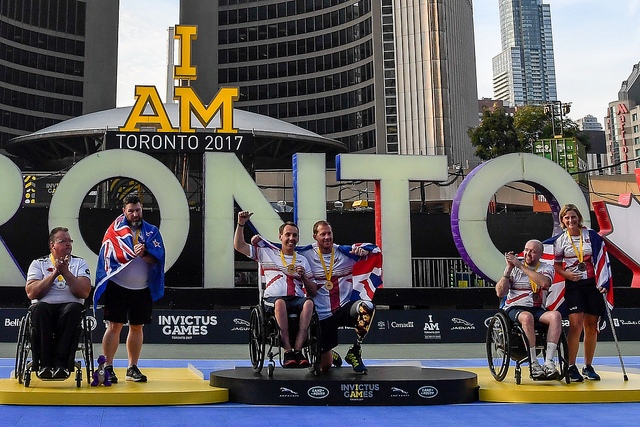
The bronze-medal game started at 4:15 p.m. with Team United Kingdom taking on Team Australia. Kirk “Spike” Hughes and Cornelia Oosthuizen of the United Kingdom faced Sean Lawler and Stewart Sherman of Australia. There was an impressive spectator turnout, and the energized crowd was loud and cheerful.
Spectators across the stands waved the flags of both countries, as they traded loud cheers of “Aussies!” and “UK!” Team United Kingdom won the bronze with a score of 6–2.
A photographer from Australia was ecstatic to see his team in the bronze-medal match. “I am happy for them,” he said. “It is nice to see them competing and playing the sport they enjoy. I enjoy taking photographs of this game and the competitors.”
Cornelia’s mom rushed to the court to hug her daughter after her bronze-medal win. “I am excited for her,” her mother said. “It is an honour to be here to share this moment with her. This is the first time her and Kirk have played together. This is her first Invictus Games.”
Wheelchair tennis wrapped up with the gold-medal match that saw competitors Kevin Drake and Alexander Krol of the United Kingdom compete against Glenn Barnes and Aaron Gibbs of New Zealand. Lots of media and photographers were on-hand snapping photos of the competition. The competition went long — 10 games were played in this gold-medal match.
The crowd was as energetic as ever, as they cheered competitors on from the stands. Wheelchair tennis competitors from the United Kingdom and New Zealand who didn’t move on to the finals were there to support their teammates. Team UK snagged the gold, with a final score of 6–4, while Team New Zealand took home the silver.
Following the match, Kevin’s and Alexander’s families ran toward them, arms spread wide and embraced them. It was clearly an emotional moment for these competitors and their families.


